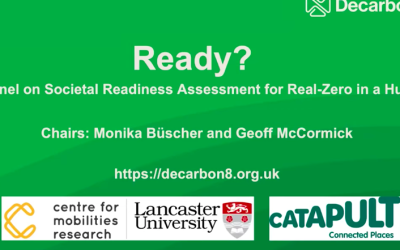Mobile Utopia brings together communities, entrepreneurs, industry and researchers from a range of different disciplines to explore how ‘mobilising’ utopia as a method for critical innovation can provide important insights into intergenerational, multi-scalar, human and non-human interconnectivities across transport, traffic and mobilities. The activities include The Mobile Utopia Experiment, where we experiment with particular mobile utopia and ways of undertaking integrative analysis and making.
More information about the Conference at the Conference Website.
To join The Mobile Utopia Experiment, please contact p.drinkall@lancaster.ac.uk with the subject header ‘Mobile Utopia Experiment’.
Mobile Utopia is jointly organised by Cemore, the International Association for Transport, Traffic and Mobility (T2M), and the Cosmobilities network, in association with the Institute for Social Futures.
From Thomas More’s Utopia (1516) to Ruth Levitas’ Utopia as method (2013) and John Urry’s What is the future? (2016), utopia has been a powerful means to explore how societies have shaped, and have been shaped by, complex im|mobilities, from microbial to big data mobilities, from horse-drawn carriages to driverless cars, from migration to planetary jet streams. Faced with the global uncertainties of the Anthropocene, utopia provides renewed analytical and creative purchase.
It is a research theme for a growing group of people at Lancaster University and beyond. There are a range of different activities, including (working backwards):
2-5 November 2017 Mobile Utopia: Pasts, Presents, Futures Conference, Centre for Mobilities Research, Lancaster University
1-2 November 2017 The Mobile Utopia Experiment, Centre for Mobilities Research, Lancaster University
29 October – 5 November Mobile Utopia Bonfire School, Centre for Mobilities Research, Lancaster University
The work started with the Mobile Utopia 1851-2051 project, a short AHRC-funded research co-creation project that sought to develop a deeper understanding of mobile utopias (and dystopias), and to creatively analyse and explore these. Critically, ‘mobile utopias’ are not transport utopias. Communicative, imaginative, embodied and disembodied, utopian and dystopian mobilities of information, people, goods, ideas as well as practices of immobilising, obstructions, borders, stasis, slowness intersect in the making of pasts, presents, futures. Activities include:
Mobile Utopia at the J Edmond Safra Fountain Court at Somerset House, London
24-26 June 2016
Mobile Utopia at the Cemore Away Day
2 June 2016, Ellel Village Hall
Mobile Utopia @Lancaster Campus in The City
18th May 2016
Nicola Spurling at the Centre for Mobilities Research Showcase
20th April 2016
Mobile Utopias Research Co-Creation Workshop
19th April 2016, 11:00 – 16:00, Design Studio, Lancaster University
Mobilizing the Urban Model: A Workshop on Spatial Analysis and Mobile Utopias of Consumption, 18th April 2016, 09:30-15:00, Lancaster University, Bowland North, SR 07
The project Mobile Utopia 1851-2051 developed through collaboration with different communities in Lancaster and Birmingham. It will take part in celebrations around the 500th Anniversary of the publication of Thomas More’s Utopia. The interdisciplinary group of researchers led by Nick Dunn, Professor of Urban Design, includes Monika Büscher, Lynne Pearce, Nicola Spurling, and Carlos López Galviz.
Critically, the project took ‘mobile utopias’ not as blueprint transport utopias, but started to ‘mobilise’ utopia as method. Communicative, imaginative, embodied and disembodied, utopian and dystopian mobilities of information, people, goods, ideas as well as practices of immobilising, obstructions, borders, stasis, slowness intersect in the making of pasts, presents, futures. Here are some examples from our growing collection of utopian everyday objects and stories.




